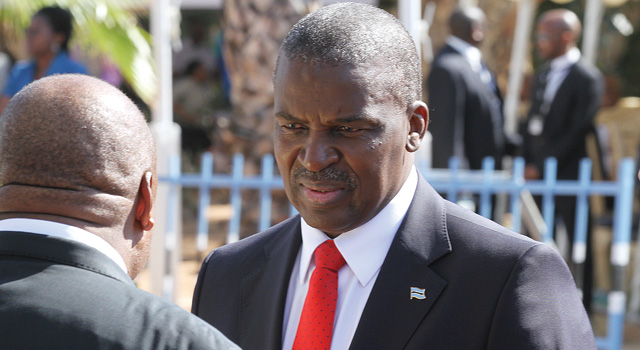The Botswana Gazette investigations have revealed that Isaac Kgosi’s younger brother, Lieutenant Colonel Shadrack Kgosi is also allegedly involved in corruption allegations and his case is said to be at the Directorate on Corruption and Economic Crime (DCEC) for investigations.
Lieutenant Colonel Shadrack is head of the 12th Batallion Unit in the Botswana Defence Force (BDF) and he heads a unit which comprises of about 700 soldiers. His brother, Isaac, who is also facing possible multiple corruption charges, is the head in the Botswana’s secretive organ, the Directorate of Intelligence and Security Services (DISS).
Isaac’s possible charges include among others, “obtaining by false pretences,” living beyond his means i.e failing to explain satisfactorily how he maintains a standard of living disproportionate to his known sources of income or assets, stealing by a person employed in the Public Service, money laundering and abuse of office.
Colonel Shadrack is likely to face charges ranging from obtaining by false pretences, official corruption or stealing by person employed in the Public Service. He could also face an administrative disciplinary hearing in the BDF whose outcome if found guilty could lead to dismissal or demotion. This publication can confirm that Lieutenant Colonel Shadrack is on duty, and has not been interdicted. According to the Public Service Act, if a public servant is under investigation, they are interdicted from duty pending their investigation. And the BDF Act Cap 21:01 section 117 (1) states that, “where a person subject to this Act is under investigation, with a view to the institution of criminal proceedings against him, either before a civil court or a court martial, the commander, or any officer so authorized by the commander, may suspend such person from the performance of his duties pending the outcome of such investigation, or the outcome of the proceedings arising therefrom.”
Information gathered by this publication reveals that Lieutenant Colonel Shadrack allegedly obtained from his juniors close to P90,000 sometime in 2014. It is alleged that he ordered his juniors to contribute P125.00 each for the name tags of the 60 soldiers who were to take part in an annual training course overseas. “He asked them to contribute the money, saying they were all required to do so as part of team work. He said the supplier had charged P125. 00 per tag,” alleged the source.
Some of the disgruntled soldiers are alleged to have inquired and even approached the supplier who informed them that she had charged around P25. 00 per tag. It was then that disgruntled soldiers took the case forward until it ended at the DCEC. Sources claim that investigations are complete, though the law enforcement officials are silent on it. Section 42 of the DCEC Act of 1994 does not allow the DCEC to share investigations with a third party.
Director, Protocol and Public Affairs BDF colonel Tebo Dikole said in an interview with The Botswana Gazette on Monday that, “the BDF provides name tags for its members since the tags are part of their uniform albeit members through their own volition may elect to procure additional name tags for themselves.” Colonel Dikole dismissed the allegations against Shadrack.
Where is the law?
In terms of the Public Service Act and BDF Act, a public officer, soldier or army officer as the case might be, suspected of commission of a criminal offence is interdicted from duty. This is routine. Not with the Kgosi brothers however. With looming serious offences involving moral turpitude and impacting adversely on the integrity of the high offices they each hold, both are still active in their positions. There is a general public perception that Isaac (and by extension his brother), wields the ultimate power in this country. After DCEC began its investigations on Isaac, the anti-graft organisation, together with the DISS, were relocated from the Ministry of Defence, Justice and Security to the Office of the President. No reason was given for this change. Pundits posited that the move was designed to ensure closer and direct control of the two organisations by the Presidency, particularly DCEC, to frustrate the investigations and possible prosecution of Isaac.
Despite reports that the case is ready for prosecution, the case appears to have hit a dead end. “We confirm that the investigations relating to the conduct of one [Isaac] Seabelo Kgosi have been completed by the DCEC and the docket has been forwarded to the DPP”, reads a letter dated 5th December, 2014, written by the Attorney General. The Director of Public Prosecutions (DPP) Leonard Sechele has recently informed this publication that Isaac’s matter may not even end up in court. Is the younger brother’s case also going in the same route? Those in the know say the reason why the younger brother is not interdicted from duty is an attempt to protect the Kgosi brothers who are close to the President. “It will be an insult to the general public should they get to know that the two brothers are facing possible criminal charges, and since they are untouchable, nothing is being done against them. Where is equality before the law?” one of the sources said. A source in the office of DPP, who preferred anonymity questioned Transparency International ratings that Botswana is one of the least corrupt countries. “By the way, who represents Botswana in this organisation? Is it not largely BDP functionaries? And where does the perception comes from if the media, as was the case with The Sunday Standard, is gagged from reporting on [Isaac] Kgosi’s corruption case?” she asked.
Refusal to Step Down
This publication is alive to the allegations that sometime early this year, President Ian Khama asked his right hand man, Isaac, to step down but that the latter flatly refused to the President’s face. The inaction on the part of President Khama to order the interdiction of Shadrack Kgosi amidst corruption allegations is seen as the latest and clear indication of the special treatment extended to the President’s close associates.

